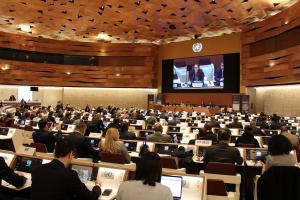Today as part of the annual session of UNECE's Inland Transport Committee (ITC), ministers from around the world adopted a Ministerial Declaration that calls for harnessing the full potential of inland transport solutions in the global fight against climate change. The declaration will give direction to the work of ITC as the United Nations platform for inland transport to deliver on climate change solutions and accelerate the transition to decarbonized mobility and net zero or low emissions in the inland transport sector.
In the declaration, ministers and heads of delegations from all UN regions request the ITC secretariat to develop a strategy document on reducing greenhouse gas (GHG) emissions in inland transport based on international United Nations legal instruments under its purview and to present it at the annual session next year.
“The transport sector represents almost 23% of global energy-related CO2 emissions and has yet to make significant progress to curb them,” said UNECE Executive Secretary Olga Algayerova. “The strategy to be prepared for next year’s ITC session will form the cornerstone of decarbonization of inland transport, which accounts for more than 71% of all transport-related CO2 emissions. If all countries and stakeholders play their role in the implementation of this strategy, this can be a game changer for climate action.”
In line with the goals of the 2030 Agenda for Sustainable Development, including the United Nations Framework Convention on Climate Change and the Paris Agreement, ministers and heads of delegations call upon member States to promote new national commitments, initiatives and measures aimed at a rapid and significant reduction in GHG emissions and air pollutants from inland transport.
They call upon ITC to accelerate promotion of environmentally efficient transport by encouraging regulations and policy development that favour the modal shift of passengers and freight towards emission-free road transport, rail, inland waterways and intermodal transport, and to promote the monitoring of this shift through relevant data collection.
“We all know that we have to do more if we want to reach our goals. We urgently need to implement solutions to reduce carbon emissions from transport. Not tomorrow, but today,” noted Hannie Meesters, Chair of ITC. “The ITC can play a key role by bringing countries and stakeholders together to agree on global standards and regulations in the areas under its mandate.”
In terms of concrete requests outlined in the Ministerial Declaration, ITC and its subsidiary bodies are expected to continue efforts to further harmonize performance requirements and intelligent transport system-related principles and efforts to directly contribute to reducing GHG emissions through the efficient use of energy. This concretely means accelerated substitution of conventionally fuelled vehicles with zero-emission vehicles, the efficient use of transport networks, the shift from private cars to public transport and shared mobility, and flexible load and storage resources for the power grid.
ITC is requested to actively support the task initiated by the Working Party on Pollution and Energy to develop a globally harmonized methodology to determine the carbon footprint of the entire life cycle of road vehicles, including in terms of GHG emissions from material extraction, vehicle and parts manufacturing, vehicle use, end-of-life processes and recyclability, and to recognize the life-cycle emissions associated with the transportation infrastructure materials, construction and maintenance as important parts of the total environmental impact of transportation.
ITC is also expected to intensify efforts towards digitalization under the main inland transport conventions, especially those dealing with carnets, transport documents and certificates, and to accelerate efforts to facilitate border crossing by means of the implementation of conventions. This could reduce the otherwise slow and cumbersome border crossing operations with extensive queues in several countries.
Finally, the declaration requests ITC to facilitate efforts to reduce demand for fossil fuels, increase energy efficiency, develop alternative fuels and the corresponding fuel infrastructure, further develop new alternative energy vehicles, green the inland fleet, enhance automation and connectivity, promote digitalization, introduce the circular economy and promote walking and cycling.
Read full Ministerial Declaration here.


